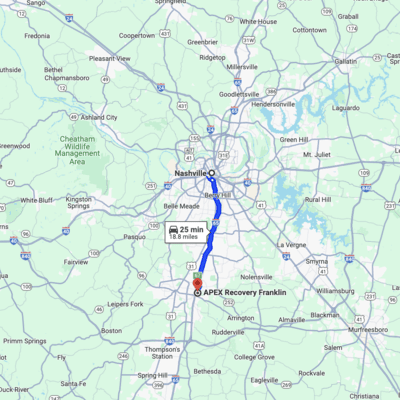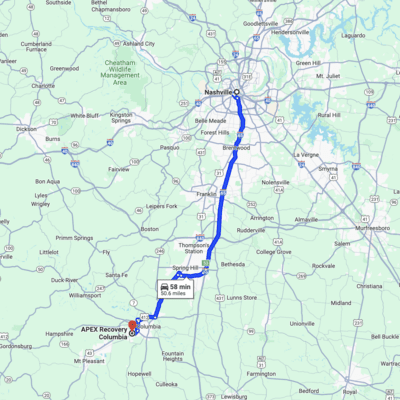Apex Recovery, based just outside of Nashville, TN, is a leading facility dedicated to addressing drug and alcohol addiction rehabilitation as well as mental health treatment. With a commitment to fostering comprehensive recovery, Apex Addiction Recovery Center’s programs are designed to provide personalized care, offering a supportive environment for individuals on their journey to recovery.
As part of the rehab treatment admissions process, Apex Recovery places a significant emphasis on thorough assessments to ensure tailored and effective interventions. Recognizing the importance of a holistic understanding of each individual’s circumstances, the facility offers complimentary drug and alcohol addiction assessments as well as mental health assessments. These assessments play a crucial role in crafting personalized treatment plans that address the specific needs and challenges faced by each client.

- Please complete and send the form below.
- One of our staff members will contact your insurer to check your coverage.
- We will contact you promptly with the results and to discuss the next steps.
Insurance Verification
"*" indicates required fields
Free Addiction Assessment
Schedule a free, confidential assessment with a licensed clinician. Apex Recovery can check your insurance coverage levels for drug and alcohol addiction, and mental health treatment.

What is a Drug and Alcohol Treatment Hotline?
A Drug and Alcohol Treatment Hotline is a dedicated helpline that provides immediate assistance and support to individuals seeking help for substance abuse issues. The primary purpose of these hotlines is to offer a confidential and non-judgmental space for people to discuss their drug and alcohol use concerns, determine available treatment options, and learn how to initiate the recovery process.
When someone calls a Drug and Alcohol Treatment Hotline, they can expect to receive empathetic and supportive communication. The hotline staff may conduct assessments to better understand the caller’s situation, provide information about various treatment programs and resources, and offer guidance on the next steps toward recovery. Additionally, these substance abuse helplines often serve as a crucial link between individuals in crisis and appropriate treatment providers, helping callers connect with rehabilitation facilities, counseling services, or support groups in their local area. The accessibility and immediacy of Drug and Alcohol Treatment Hotlines contribute to their role as a vital resource for those seeking help and information about overcoming substance abuse.
What is a Drug and Alcohol Treatment Hotline?
A Drug and Alcohol Treatment Hotline is a dedicated helpline that provides immediate assistance and support to individuals seeking help for substance abuse issues. The primary purpose of these hotlines is to offer a confidential and non-judgmental space for people to discuss their drug and alcohol use concerns, determine available treatment options, and learn how to initiate the recovery process.
When someone calls a Drug and Alcohol Treatment Hotline, they can expect to receive empathetic and supportive communication. The hotline staff may conduct assessments to better understand the caller’s situation, provide information about various treatment programs and resources, and offer guidance on the next steps toward recovery. Additionally, these substance abuse helplines often serve as a crucial link between individuals in crisis and appropriate treatment providers, helping callers connect with rehabilitation facilities, counseling services, or support groups in their local area. The accessibility and immediacy of Drug and Alcohol Treatment Hotlines contribute to their role as a vital resource for those seeking help and information about overcoming substance abuse.
What is Substance Use Disorder (SUD)?
Substance Use Disorder (SUD) is a medical condition marked by the problematic use of substances, be it alcohol or drugs, resulting in substantial impairment or distress. The severity of SUD varies based on criteria like impaired control, social dysfunction, risky use, and pharmacological indications of tolerance and withdrawal. This complex health issue requires tailored treatment strategies to be successful.
Diagnosing and treating SUD is a multifaceted process, involving a comprehensive understanding of an individual’s circumstances. It requires careful assessment of the specific patterns of substance misuse and its impact on one’s life. Successful interventions often involve personalized treatment plans that may include counseling, therapy, medication, and support services. Recognizing the individual nature of SUD is crucial, as effective recovery strategies must consider the unique challenges and factors contributing to each person’s substance use patterns.

Are Addiction Treatment Hotline Numbers Open 24 Hours?
While many Addiction Treatment Hotline numbers operate on a 24/7 basis to provide round-the-clock assistance, it’s important to note that not all hotlines follow this model. Some hotlines may have specific hours of operation, and individuals seeking support should be aware of the availability of the particular hotline they intend to call.
However, Apex Drug and Alcohol Addiction Recovery Center stands out as an example of a facility committed to providing continuous support. With a dedication to serving individuals in need, Apex Recovery operates its helpline 24/7 – (877) 881-2689. This means that whether it’s day or night, individuals seeking assistance for drug and alcohol addiction or mental health concerns can reach out for immediate help and guidance. If you or someone you know is in need of support, don’t hesitate to contact us or call Apex Recovery’s 24/7 helpline to initiate the first steps toward recovery. Again, that’s (877) 881-2689.
Are Substance Addiction Hotlines Free?
While some substance addiction hotlines are toll-free, others may charge a fee for their services. It’s crucial for those seeking support to be aware of the specific hotline’s pricing structure before making a call. Financial considerations should not be a barrier to getting help, so it’s advisable to inquire about any potential charges associated with a particular hotline.
Or go with the sure thing. Apex Recovery is committed to providing a free drug addiction help hotline. The facility recognizes the importance of removing financial barriers for individuals seeking help for substance addiction or mental health issues. By offering a toll-free drug withdrawal hotline, we ensure that individuals can access the support they need without the worry of additional expenses, reinforcing their commitment to making help accessible to all.

Free Addiction Assessment
Schedule a free, confidential assessment with a licensed clinician. Apex Recovery can check your insurance coverage levels for drug and alcohol addiction, and mental health treatment.

Rehab Center Near Nashville, TN That Takes Cigna
Apex Recovery center outside of Nashville, Tennessee is among the rehab centers that take Cigna rehab insurance. Our center is staffed with licensed mental health professionals who offer you a range of evidence-based and holistic treatment approaches to support your rehabilitation and recovery.
Apex Recovery Franklin
4601 Carothers Pkwy STE 250A Franklin, TN 37067
Apex Recovery Columbia:
2710 Trotwood Ave STE A & B
Columbia, TN 38401


Are Nashville Substance Abuse Helplines Private and Confidential?
Apex’s substance abuse helpline prioritizes the privacy and confidentiality of individuals reaching out for assistance. Callers can expect a confidential environment where personal information and discussions are treated with the utmost discretion. All calls made to their helpline are handled with the highest level of privacy, ensuring you can share concerns, experiences, and questions without fear of judgment or disclosure.
Professionals staffing these helplines for alcohol addiction are trained to adhere to strict confidentiality standards, and the details shared during the conversation are kept private to create a safe space for individuals to open up about their struggles with substance abuse. Apex Recovery’s commitment to confidentiality is crucial in building trust and encouraging open communication, key elements in the process of seeking help and embarking on the journey to recovery.
Can I Call an Addiction Helpline on Behalf of Someone Else in Nashville, TN?
Yes, you can certainly call addiction helplines on behalf of someone else. Many helplines are open to receiving calls from concerned friends, family members, or other individuals seeking assistance for someone struggling with substance abuse. When calling on behalf of someone else, it’s helpful to provide as much relevant information as possible, to receive appropriate guidance and assistance.
It’s important to note that while you can initiate the call and gather information, the person experiencing the substance abuse issue will typically need to engage directly with the helpline for personalized assessments and discussions about their specific needs. Helpline professionals can guide you on how to encourage the individual to seek help and provide information on available resources and treatment options. Calling on behalf of someone else is a proactive and supportive step toward helping them access the assistance they may need on their journey to recovery.
Free Addiction Assessment
Schedule a free, confidential assessment with a licensed clinician. Apex Recovery can check your insurance coverage levels for drug and alcohol addiction, and mental health treatment.
What Substance Addiction Can I Discuss by Phone?
When reaching out to addiction hotlines, individuals can openly discuss concerns about a range of substances they are taking or may be worried about. The following sections provide specific hotlines tailored to different types of substance addiction, including examples such as alcoholism, opioids, cocaine, heroin, illicit drugs, benzodiazepines, OxyContin, Xanax, and prescription drugs. These hotlines offer specialized support, ensuring individuals receive guidance relevant to their unique substance abuse challenges.
Alcohol Addiction Hotline
The Alcohol Addiction Hotline is a dedicated resource for individuals contending with alcohol abuse or seeking information about alcohol-related issues. By calling this hotline, individuals can discuss their concerns, experiences, and questions with trained professionals who provide confidential and supportive assistance. Whether one is seeking help for themselves or a loved one, hotlines for alcohol addiction offer valuable guidance, resources, and information to initiate the journey towards recovery and a healthier relationship with alcohol.
Opioid, Cocaine, Heroin and Illicit Drug Addiction Hotline
The Opioid, Cocaine, Heroin, and Illicit Drug Addiction Hotline serves as a critical resource for individuals struggling with substance abuse involving opioids, cocaine, heroin, or other illicit drugs. This hotline is staffed by trained professionals equipped to address the specific challenges associated with these substances. Callers can confidentially discuss their concerns, receive information about available treatment options, and gain support for their journey towards recovery. By offering specialized assistance, this hotline plays a vital role in connecting individuals with the resources and guidance needed to overcome addiction to opioids, cocaine, heroin, or other illicit substances.
Benzodiazepines, OxyContin, Xanax and Prescription Drug Hotline
The Benzodiazepines, OxyContin, Xanax, and Prescription Drug Hotline is a specialized resource for individuals facing challenges related to the misuse or addiction of prescription medications. Trained professionals on this hotline offer confidential drug addiction support to those seeking information, guidance, or assistance in addressing issues specific to prescription drug abuse. If you or a family member is concerned about substance abuse, this hotline provides a confidential space to discuss the complexities of prescription drug addiction and offers resources to help navigate the path towards recovery.

Can I be Tested for Addiction by Phone in Nashville, TN?
You can discuss your substance abuse concerns, experiences, and treatment needs with trained professionals through our addiction hotline. These confidential conversations provide an opportunity to explore the nature and severity of the addiction, inquire about available treatment options, and receive guidance on the next steps toward recovery. The hotline staff can assess the individual’s situation and provide information about addiction.
However, for a more comprehensive assessment and personalized treatment plan, consider booking an appointment with Apex Recovery. Offering a range of evidence-based therapies and support services, Apex Alcohol and Drug Addiction Recovery Center conducts thorough assessments to understand the unique needs of each individual. This in-person evaluation allows for a more detailed understanding of the addiction, co-occurring issues, and other factors influencing the individual’s well-being. To initiate this process and embark on a tailored recovery journey, contact us here or call Apex Recovery at (877) 881-2689 to schedule an appointment.
Addiction Treatment Specialist Near Nashville, TN
As an addiction treatment specialist, Apex Substance Addiction Recovery Center prioritizes a holistic approach to recovery, addressing not only the immediate challenges of substance use but also the underlying factors contributing to addiction. Their comprehensive programs include counseling, therapy, and support services tailored to individual needs.
Apex is dedicated to providing a supportive and compassionate environment where you can embark on a transformative journey towards sustained recovery. If you’re seeking expert assistance and personalized care in overcoming addiction, Apex Addiction Recovery Center is poised to guide you on the path to lasting well-being. You can even check your insurance with a few clicks, so contact us online or call us at (877) 881-2689 today.
Free Addiction Assessment
Schedule a free, confidential assessment with a licensed clinician. Apex Recovery can check your insurance coverage levels for drug and alcohol addiction, and mental health treatment.
What Mental Health Disorders Can I Discuss by Phone?
When seeking mental health support over the phone, you can openly discuss various concerns about different disorders. The following sections provide specific hotlines tailored to Major Depressive Disorder (MDD), Anxiety Disorders Testing and Assessment, Obsessive-Compulsive Disorder (OCD), and Borderline Personality Disorder (BPD), offering specialized guidance and information for those with unique mental health concerns.
Major Depressive Disorder (MDD) Hotline
The Major Depressive Disorder (MDD) Hotline is a specialized resource for individuals dealing with the challenges of major depressive disorder. This hotline provides a confidential space for individuals to discuss their experiences, emotions, and questions related to MDD with trained professionals. Callers can receive empathetic support, information about available treatments, and resources to help manage and cope with the symptoms of Major Depressive Disorder.
Anxiety Disorders Testing and Assessment
The Anxiety Disorders Testing and Assessment hotline is a dedicated resource for individuals seeking information and support related to anxiety disorders. Trained professionals on this hotline offer assistance in understanding and assessing anxiety symptoms, guiding callers through the process of identifying potential anxiety disorders. You can discuss your concerns, experiences, and questions in a confidential environment, gaining insights into available testing and assessment options for anxiety disorders.
Obsessive-Compulsive Disorder (OCD) Hotline
The Obsessive-Compulsive Disorder (OCD) Hotline serves as a specialized support resource for individuals navigating the challenges of OCD. Trained professionals on this hotline offer confidential assistance to those dealing with obsessive thoughts and compulsive behaviors. Whether you are seeking information about treatment options, strategies for symptom relief, or general support, the OCD Hotline provides a compassionate space for you to share you concerns and access resources tailored to the complexities of obsessive-compulsive disorder.
Borderline Personality Disorder (BPD) Hotline
The Borderline Personality Disorder (BPD) Hotline is a specialized resource designed to offer support and guidance to individuals dealing with the challenges of borderline personality disorder. Trained professionals on this hotline provide a confidential space for individuals to discuss their experiences, emotions, and questions related to BPD. Callers can receive empathetic support, information about available treatments, and resources to help manage the symptoms associated with borderline personality disorder.
Some Substance Abuse Statistics around Nashville, Tennessee
- In 2021, 56.6 per 100,000 people over dosed in the state of Tenessee
- There were 3,038 fatal overdoses related to opioids in Tennessee in 2021
- 80% of fatal overdoses were related to opioids in 2021
- The age-adjusted opioid overdose death rate in Tennessee was 45.5 per 100,000 people in 2021, compared to 10.1 per 100,000 in 2011
- There were over 7,000 overdoses that were not fatal, but resulted in inpatient stays in the state
- In the Nashville-Davidson-Murfreesboro-Franklin MSA, 9.3 percent of people age 12 or older were classified as with a substance use disorder. This is higher than the Tennessee average which sat at 8 percent over the same time period
Sources:
kff.org
Tn.gov
samhsa.gov
What Questions Do Drug and Alcohol Hotlines Ask?
Navigating the complexities of substance abuse often involves seeking assistance from dedicated hotlines. When reaching out for support, callers can anticipate a series of questions designed to gather crucial information. These inquiries help hotline operators understand the individual’s unique circumstances, tailoring their guidance and recommendations for effective intervention resources and recovery. Here are some common questions asked by drug and alcohol hotlines and explanations for asking:
- What is the nature of the problem?
- Explanation: Hotline operators often begin by asking for a brief overview of the individual’s situation, inquiring about the type and severity of substance use, and any immediate concerns or crises.
- Is there any immediate safety concern or urgency?
- Explanation: Questions related to the person’s safety and urgency are crucial to assess the immediate risk of harm and to determine if emergency intervention is needed.
- Can you share your substance use history, including the types and frequency of use?
- Explanation: Understanding the person’s history of substance use helps in gauging the severity of the issue and tailoring appropriate assistance.
- Have you undergone any past treatment or rehabilitation attempts?
- Explanation: Inquiring about any previous attempts at treatment provides insight into the individual’s experiences, challenges, and potential preferences for future interventions.
- Can you provide details about your medical and mental health history?
- Explanation: Assessing the person’s overall health helps in identifying potential co-occurring issues and informs the development of a comprehensive treatment plan.
- Who is in your support system, including family and friends?
- Explanation: Questions about the person’s support system help in understanding the available resources for ongoing assistance and recovery.
- What motivates you to change your current situation?
- Explanation: Understanding the individual’s motivation and readiness for change is crucial in tailoring the approach to their specific needs and creating a plan that aligns with their goals.
- What are your specific triggers and stressors that contribute to substance use?
- Explanation: Identifying specific triggers and stressors aids in developing coping strategies and preventive measures for future situations.
- Are there any legal issues or consequences related to your substance use?
- Explanation: Questions about any legal consequences or involvement related to substance use can help in addressing potential legal challenges and connecting the individual with appropriate resources.
- Can you provide information about your insurance coverage and financial resources?
- Explanation: Gathering information about insurance coverage and financial resources is essential for guiding individuals toward treatment options that are accessible and align with their financial situation.
